The health benefits of mushrooms may be as extensive as there are mushroom types — and there are about 10,000 different mushroom types out there!
Mushrooms (fungi) are interesting forms of life. They pop up, seemingly overnight, seemingly out of nowhere. And they’re not green, they don’t have leaves or roots, and they never form flowers, fruits, and seeds.
Because they provide such powerful (and unique) nutrition, mushrooms are a favorite food source for many animals. Ants and termites even cultivate their own mushroom gardens!
And from a biological standpoint, mushrooms actually share a lot in common with the animal kingdom.
This may help explain why many of the ingredients that help mushrooms defend themselves against their enemies also support our body’s defense mechanisms [1].
Using mushrooms for their health benefits is not a new idea, of course. Many ancient cultures have treasured them for centuries.
And now modern research confirms that many species of mushrooms contain some of the most potent, yet safest, ingredients for health known [2].
No wonder more than a hundred species of mushrooms are being studied across the world today for their potential health benefits.
Let’s take a closer look at five key health benefits of mushrooms, including a brief dive into some more extensively researched mushroom types that support these benefits…
Mushroom Health Benefit #1:
They Can Help FIGHT Free Radicals

You may have heard about “free radicals” that can damage various structures in your body’s cells.
This cellular damage contributes to an increased risk for developing many health conditions, including those related to aging.
Elimination or inactivation of free radicals, as well as ensuring that they don’t form in excess, greatly benefits your health.
Consuming organic foods rich in dietary antioxidants such as vitamin C, vitamin A, selenium, beta-carotene, and other nutrients from fresh fruits and vegetables is a powerful way to combat free radical damage.
Using USDA Certified Organic products on your skin that contain these antioxidants is also important (as your skin “consumes” them, too, and they help with anti-aging).
Promisingly, many mushrooms also contain very powerful compounds that neutralize free radicals.
For instance, extracts of the medicinal and dietary mushroom reishi (Ganoderma lucidum) have been shown to reduce free radical activity [3].
Known in China as the “spirit plant,” reishi is believed to relax and fortify both mind and body.
Chaga (Inonotus obliquus) is another mushroom known for its antioxidant properties [4,5,6].
Indeed, a chaga polysaccharide has been reported to possess “strong antioxidant activity for scavenging free radicals [7].”
Similarly, polysaccharides present in the cordyceps mushroom may provide very powerful antioxidant protection to neutralize harmful are radicals [8].
Mushroom Health Benefit #2:
A MUST for Immune System Support
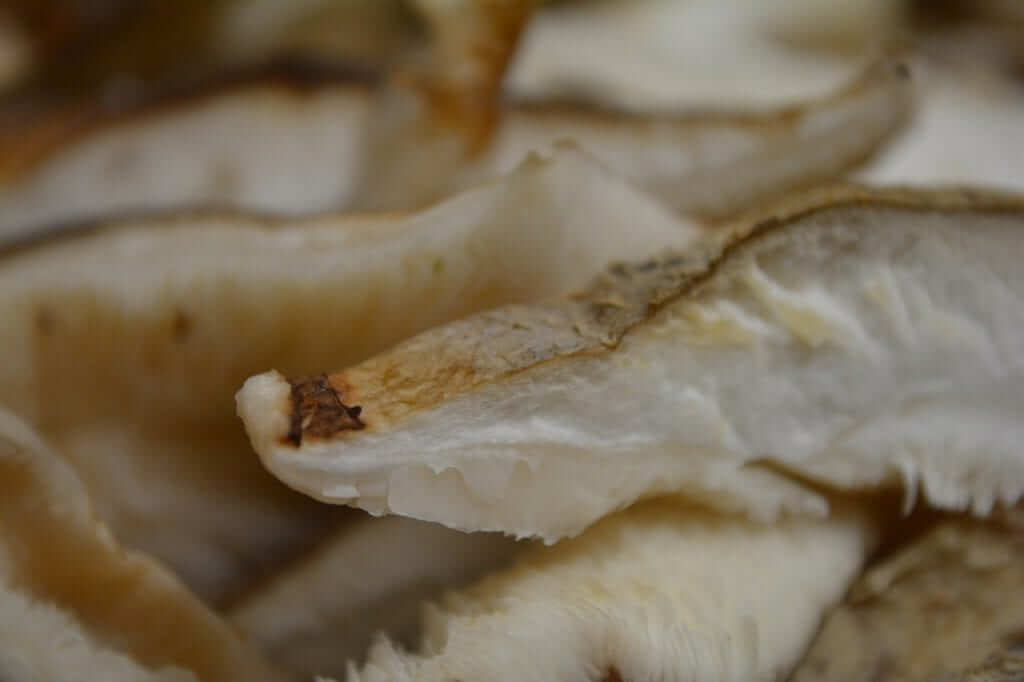
Mushrooms boost both the levels and activity of many vital components of the immune system.
They may even “prime” immune cells so that they become more responsive to future infections and attacks [9].
For instance, a chaga polysaccharide may help induce rapid increases in macrophages, along with raising levels of the immune signaling compounds known as cytokines [10].
Macrophages are a type of immune white blood cell that engulfs and digests cellular debris, foreign substances, microbes, cancer cells, and anything else in the body that does not appear healthy to the immune system.
Similarly, chaga may help increase protective white blood cells [11].
Reishi has also been shown to help boost the production of various components of the immune system, including macrophages T-lymphocytes, and natural killer (NK) cells, which detect and destroy cancer cells and cells infected with viruses [12].
In patients, treatment for 12 weeks with a reishi polysaccharide was shown to strengthen immune function [13,14].
Shiitake (Lentinula edodes) is one of the most popular and best-studied mushrooms around today.
These mushrooms contain a polysaccharide known as lentinan, which has been described as “a unique class of immunopotentiator” that helps to improve the quality of life and extend survival, with very few side effects.
Indeed, consumption of dried shiitake mushrooms daily for 4 weeks has been shown to increase the numbers of T immune cells and natural killer (NK) cells in a human intervention study [15].
Turkey tail mushroom (Trametes versicolor, Coriolus versicolor) contains a protein-bound polysaccharide known as PSK or Krestin, which has been shown to support the immune system and is a popular cancer treatment that has generated several hundred million dollars of sales in Asia [16].
Turkey tail extracts may boost the activity of natural killer (NK) cells, while also increasing T-lymphocyte counts [17].
Numerous studies and clinical trials show that polysaccharopeptide (PSP), another potent compound found in turkey tail, may help to boost the immune system [18].
Mushroom Health Benefit #3:
They May Help Manage Blood Sugar Levels
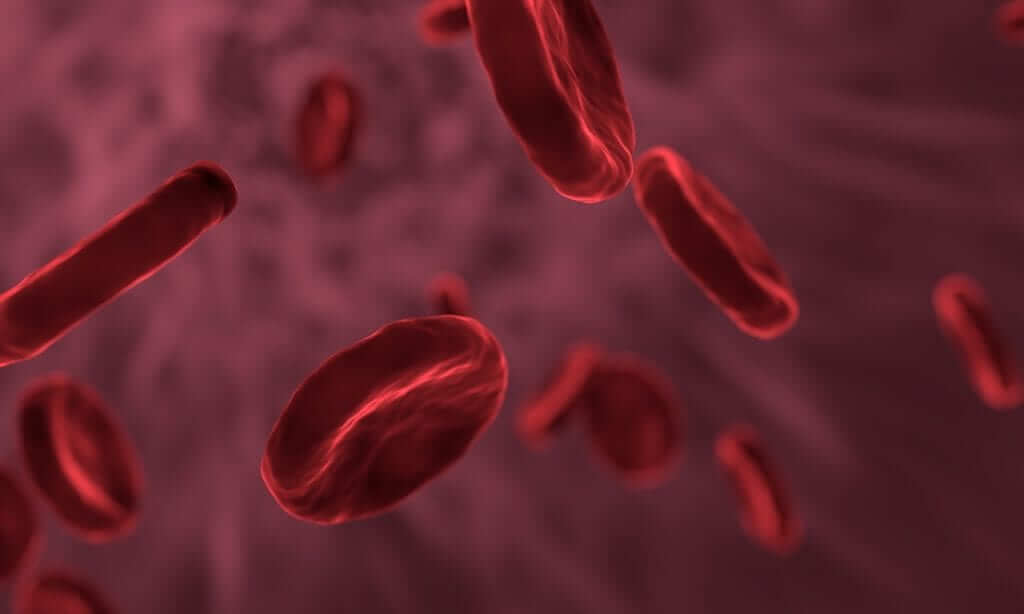
Another big health benefit of mushrooms is that they may help manage safe levels of blood sugar.
For example, compounds from cordyceps (Cordyceps sinensis) have been shown to help support blood sugar levels within the normal range.
Studies have shown polysaccharide in cordyceps may contribute to potent blood-sugar-lowering and significant reductions in fasting blood glucose levels [19, 20].
Diabetic nephropathy develops because of kidney damage caused by high blood sugar levels. In another promising study, cordyceps was also shown to significantly reduce blood glucose levels, and to lower kidney dysfunction markers [21].
Chaga mushroom extracts and polysaccharides also help to support blood sugar levels within the normal range. A study on Chaga polysaccharide showed the potential for significant reduction in body weight, fasting blood glucose levels, and insulin levels [22].
Mushroom Health Benefit #4:
They’re Excellent for Brain Health

Mushrooms are fast becoming synonymous with brain health.
For example, the ball-shaped mushroom with cascading icicle-like spines known as lion’s mane or yamabushitake – scientific name Hericium erinaceus– has a long history of use in traditional Chinese medicine [23, 24].
Once reserved for royal families, lion’s mane contains up to 20 percent protein and is considered to be a gourmet dish by many.
Promisingly, potent compounds in lion’s mane have been shown to activate a very important peptide (a small protein) in our bodies known as “nerve growth factor” or NGF.
Nerve growth factor is necessary for the growth, maintenance, and survival of our brain cells, known as neurons.
These lion’s mane compounds stimulate our neurons to re-grow, along with triggering a process known as re-myelination, which helps to keep neurons healthy and maintains their ability to conduct electrical signals efficiently [25,26].
In a Japanese clinical study, elderly men and women with mild cognitive impairment (MCI) were given yamabushitake for 16 weeks.
Symptoms of MCI include problems with memory, language, thinking, and judgment that are greater than normal age-related changes.
Throughout the study period, the yamabushitake group showed significantly increased scores on a cognitive function scale compared with the placebo group, but only as long as they kept consuming the mushroom [27].
Similarly, lion’s mane has been shown to help prevent the breakdown of spatial short-term and visual recognition memory while supporting cognitive improvement, especially in many age-related health conditions [28,29,30].
Short-term memory refers to our ability to hold a small amount of information in our minds in a readily available state for a short period of time.
Visual recognition memory has to do with our ability to recognize previously encountered events, objects, or people, to “remember” them.
Both of these types of memories are lost in people with age-related health conditions, but shown to be supported by consuming lion’s mane.
Mushroom Health Benefit #5:
They Help Boost Physical Performance

Mushrooms have been shown to increase stamina and other aspects of physical performance.
The mushroom cordyceps, for example, made international headlines after Chinese runners shattered no less than nine world records by huge margins at the Chinese National Games back in 1993.
They credited their intense training regimen and their use of cordyceps [31,32,33] for this remarkable achievement.
In a 2010 study, a cordyceps extract known as Cs-4 was given to 20 healthy elderly subjects three times per day for 12 weeks [34]. Supplementation with Cs-4 was seen to improve their exercise performance and overall wellness.
Cordyceps contains adenosine and can stimulate production of ATP, one of the main sources of energy in our body’s cells [35].
This may be one of the reasons why it improves stamina.
Further, cordyceps extracts have been shown to dilate the aorta (the main artery in the body) by up to 40 percent, thereby increasing blood flow and greatly enhancing endurance [36].
No wonder then that supplementation with cordyceps in a Japanese study improved the performance of over 70 percent of long-distance runners [37].
Other Key Mushroom Health Benefits
The health benefits of mushrooms doesn’t stop there. Not even close. Just a few of their other benefits include helping to:
Boost vitamin D, which is crucial for your body in many ways, from fighting depression to preventing pain
Protect bladder health, because they’re rich in selenium, which research shows may protect against bladder cancer [38]
Aid in weight loss, in part because they’re loaded with B vitamins that help turn carbohydrates into fuel and burn energy.
Important Points About Consuming Mushrooms

Even though the mushrooms discussed in this article are considered safe, it is always best to play it safe and consult your physician before consuming large quantities or taking any mushroom supplements, especially if you have a pre-existing health condition.
Also, unless you’re a trained botanist or mycologist (an expert who specializes in the study of fungi), please think twice (and then a third time!) before going out into fields and forests to harvest wild mushrooms on your own, as many mushroom varieties are poisonous.
And even though mushrooms are considered some of the least pesticide-ridden ridden vegetables, when choosing mushrooms at the store or at farmers markets, do still strongly consider organic varieties, as they still may otherwise still contain some unwanted chemicals.
If you are looking into a mushroom supplement, be aware that all the beneficial compounds in functional mushrooms are notoriously difficult to extract. One of the best methods is the double-extraction technique that uses both water and alcohol to extract a full spectrum of powerful plant compounds.
How to Get the Power of 4 of Nature’s Premiere Mushrooms
Routinely eating a range of different mushrooms is best. However, if you find that difficult to do, do consider taking a top-quality mushroom supplement — and definitely look into the Mushroom Fourtress bundle from Nicole’s Apothecary.
This bundle contains four different bottles of potent mushroom tinctures: cordyceps, lion’s mane, reishi, and turkey tail.
Not only are these tinctures made using the double-extraction method to get the maximum amount of beneficial compounds possible, Nicole’s Apothecary goes a step further and uses the “spagyric method” as the final step.
The spagyric extraction method burns the plant material left over after the first two extractions to produce a mineral-rich ash that can be added to the final product. This may sound a bit odd at first; however, it ensures a high amount of beneficial compounds in the tinctures.
You get the benefits of cordyceps for stamina… lion’s mane for brain… reishi for fighting free radicals… and turkey tail for a healthy immune system — all in one bundle!
Learn more about the 4-bottle Mushroom Fourtress bundle here and how these fungi can benefit your health.
REFERENCES
- Paul Stamets, “MycoMedicinals: An Informational Treatise on Mushrooms”, (MycoMedia Productions), 2002, 32-34.
- Radical scavenger and antihepatotoxic activity of Ganoderma formosanum, Ganoderma lucidum and Ganoderma neo-japonicum.
- Memorial Sloan Kettering Cancer Center: Chaga Mushroom.
- Chemical characterization and biological activity of Chaga (Inonotus obliquus), a medicinal “mushroom”.
- Investigation of three lignin complexes with antioxidant and immunological capacities from Inonotus obliquus.
- Antioxidant activity of Inonotus obliquus polysaccharide and its amelioration for chronic pancreatitis in mice.
- Cordyceps militaris polysaccharides can enhance the immunity and antioxidation activity in immunosuppressed mice.
- The Journal of Nutrition: Mushrooms and Health Summit Proceedings.
- Purification, characterization and biological activity of a novel polysaccharide from Inonotus obliquus.
- Immunomodulatory Activity of the Water Extract from Medicinal Mushroom Inonotus obliquus.
- Studies on the immuno-modulating and anti-tumor activities of Ganoderma lucidum (Reishi) polysaccharides.
- Effects of ganopoly (a Ganoderma lucidum polysaccharide extract) on the immune functions in advanced-stage cancer patients.
- Protection against lung cancer patient plasma-induced lymphocyte suppression by Ganoderma lucidum polysaccharides.
- Consuming Lentinula edodes (Shiitake) Mushrooms Daily Improves Human Immunity: A Randomized Dietary Intervention in Healthy Young Adults.
- Paul Stamets, “MycoMedicinals: An Informational Treatise on Mushrooms”, (MycoMedia Productions), 2002), 42-44.
- Phase 1 Clinical Trial of Trametes versicolor in Women with Breast Cancer.
- Immunomodulatory and antitumor properties of polysaccharide peptide (PSP).
- Polysaccharides in fungi. XXXVI. Hypoglycemic activity of a polysaccharide (CS-F30) from the cultural mycelium of Cordyceps sinensis and its effect on glucose metabolism in mouse liver.
- CordyMax Cs-4 improves glucose metabolism and increases insulin sensitivity in normal rats.
- Cordyceps militaris Treatment Preserves Renal Function in Type 2 Diabetic Nephropathy Mice.
- Anti-diabetic effects of Inonotus obliquus polysaccharides-chromium (III) complex in type 2 diabetic mice and its sub-acute toxicity evaluation in normal mice.
- Beneficial effects of the ethanol extract from the dry matter of a culture broth of Inonotus obliquus in submerged culture on the antioxidant defence system and regeneration of pancreatic beta-cells in experimental diabetes in mice.
- Hericium erinaceus: an edible mushroom with medicinal values.
- Lion’s Mane: A Mushroom That Improves Your Memory and Mood?
- The Unique and Versatile Lion’s Mane Mushroom.
- Improving effects of the mushroom Yamabushitake (Hericium erinaceus) on mild cognitive impairment: a double-blind placebo-controlled clinical trial.
- Effects of Hericium erinaceus on amyloid β(25-35) peptide-induced learning and memory deficits in mice.
- The Unique and Versatile Lion’s Mane Mushroom.
- Improving effects of the mushroom Yamabushitake (Hericium erinaceus) on mild cognitive impairment: a double-blind placebo-controlled clinical trial.
- The Unique and Versatile Lion’s Mane Mushroom.
- Are Cordyceps Magic, Medicinal Mushrooms?
- Steinkraus, D.C. and Whitfield, J.B., 1994. “Chinese Caterpillar Fungus and World Records”.American EntomologistWinter 235-39.
- Pegler, D.N., Yao, Y.J., and Li, Y., 1994. “The Chinese Caterpillar Fungus”. The Mycologist8: 3-5.
- Effect of Cs-4 (Cordyceps sinensis) on exercise performance in healthy older subjects: a double-blind, placebo-controlled trial.
- Cordyceps as an Herbal Drug.
- Naoki et al., 1994. “Pharmacological studies on Cordyceps sinensis from China”. Abstracts from the Fifth Mycological Congress. Vancouver, BC August 14-21.
- Hiyoshi, T., Mutsunori, F., and Akasu, F., 1996. “Cordyceps sinensiseffects on cardiopulmonary function of long-distance runners”. Japanese Journal of Physical Fitness and Sports Medicine45: 474.
- “Selenium is inversely associated with bladder cancer risk: a report from the Belgian case-control study on bladder cancer.”
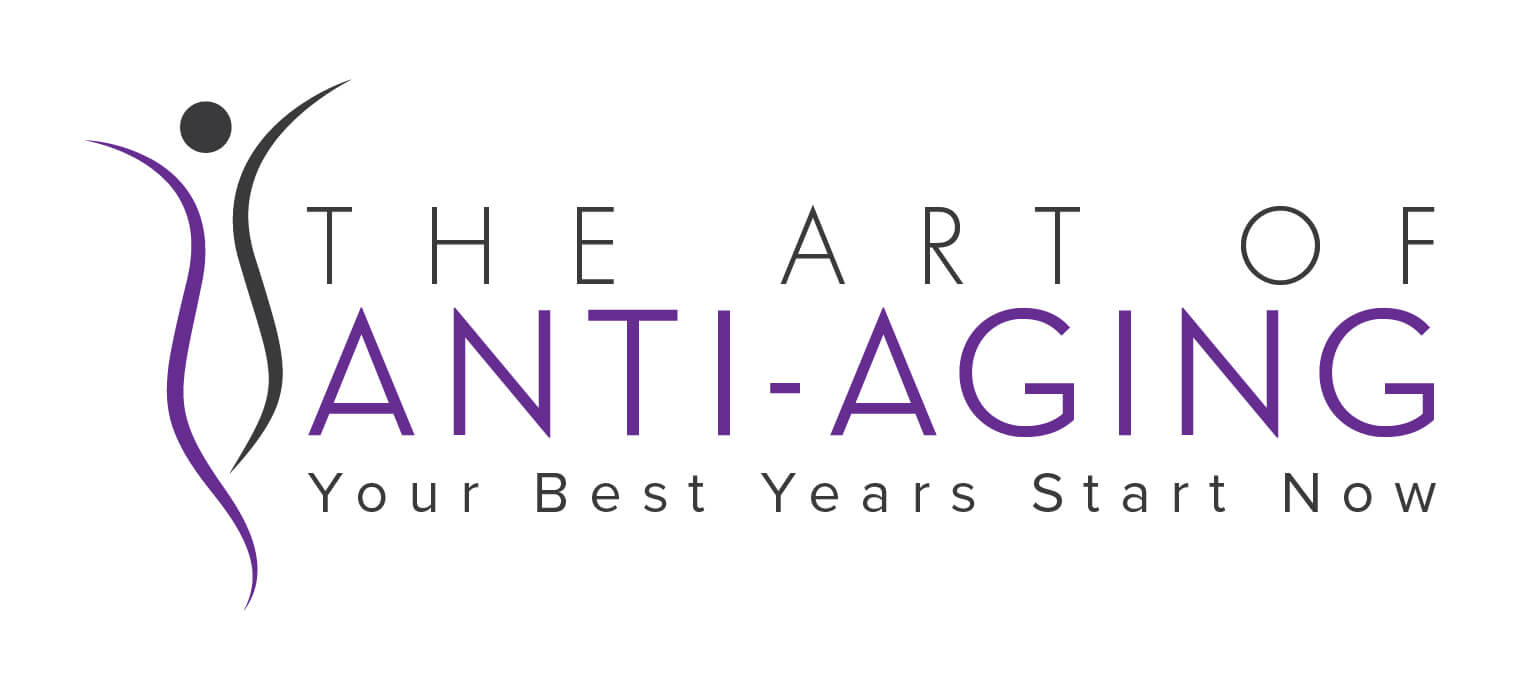

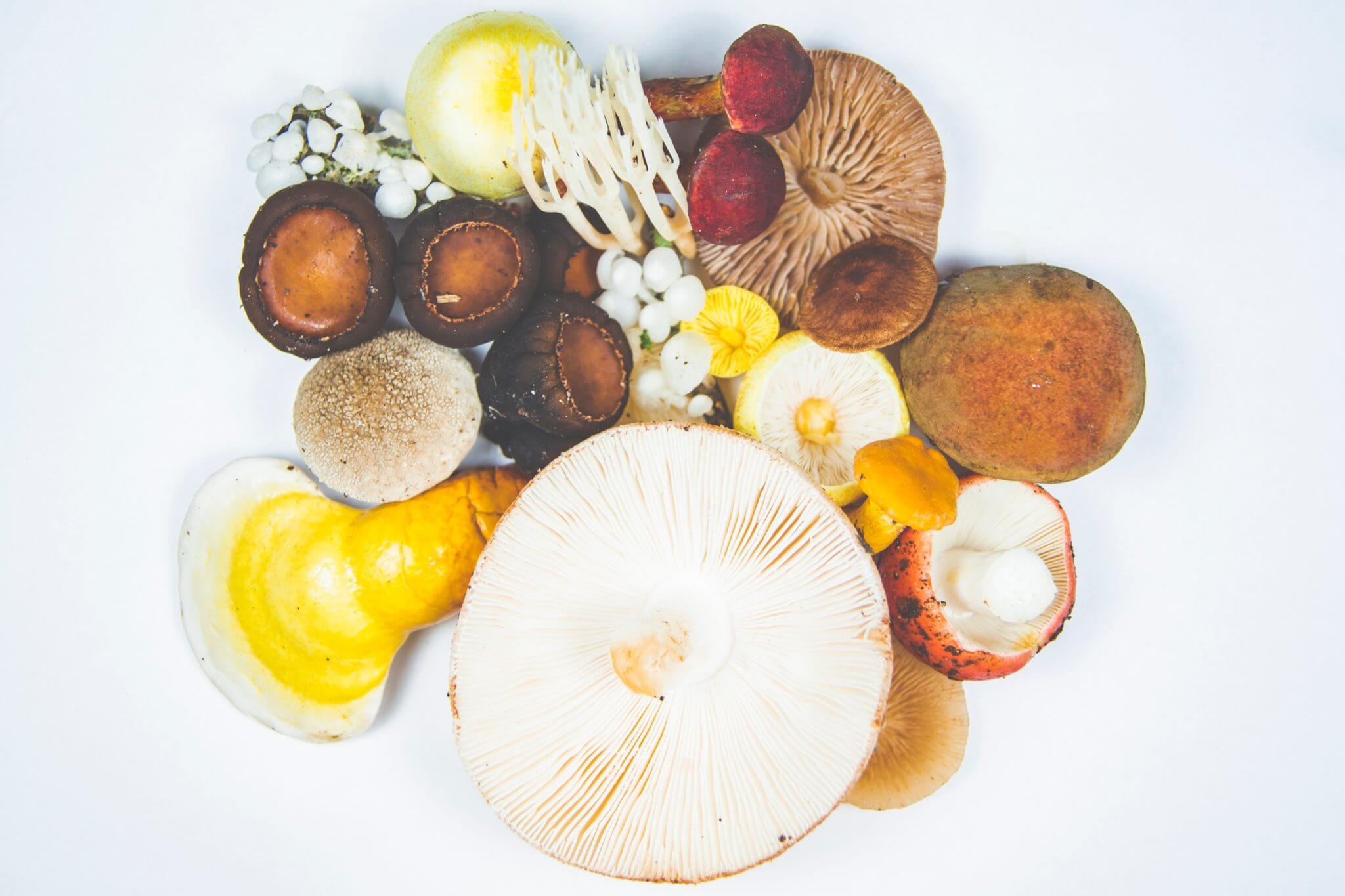
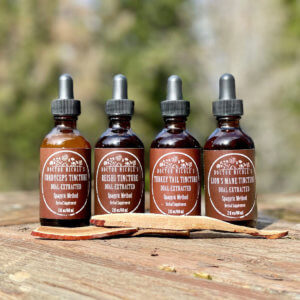
AMAZING ,I WILL START EATING MUSHROOMS’
THANK YOU
Great article , it reinforced my health practices.
Thanks for this very interesting info Brian. I’m already a big fan of mushrooms, good to know all the health benefits.
Thanks for the funny “dad jokes” too. With all that’s going on in the world we need some humour
great info
Great Information!!!!
Thank you for the reminders and for adding some additional knowledge . I needed this reminder. You are doing a fantastic job
Very informative I will start adding mushrooms to my diet